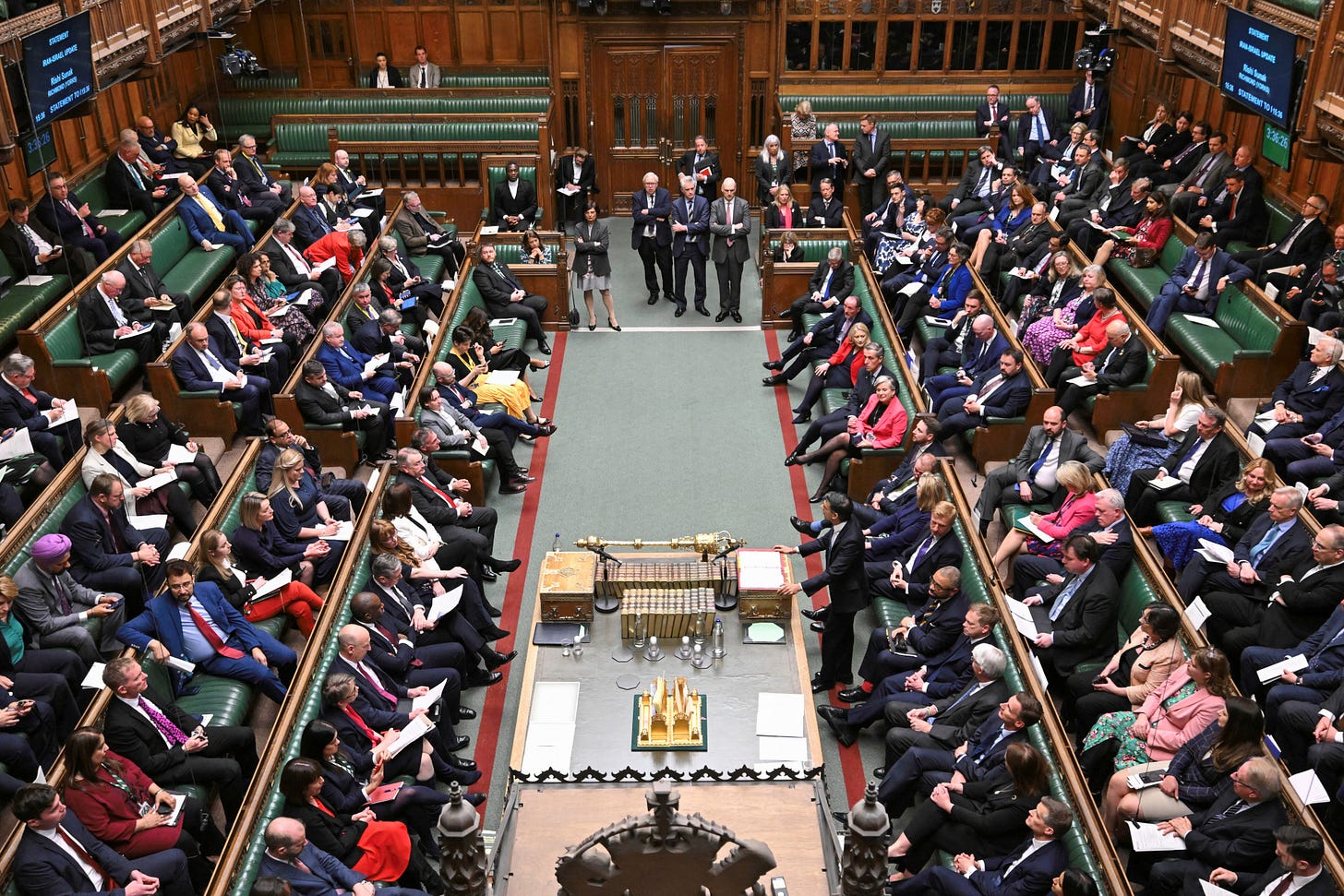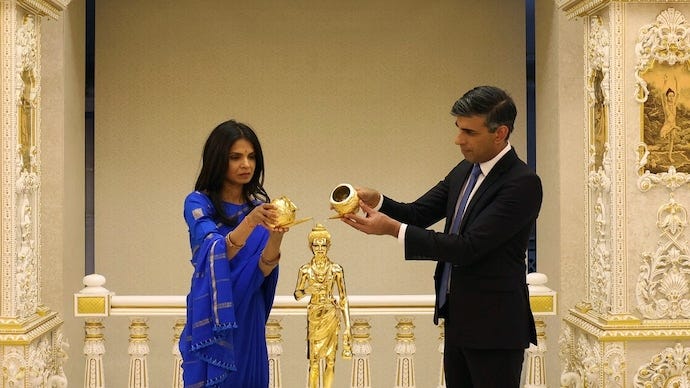UK General Election 🇬🇧: Rishi Sunak and Tory Cohorts on Way Out?
The writing seems to be on the wall as all pre-poll surveys indicate the Labour Party is heading towards a landslide victory.
House of Commons Elections— Uncommon Outcome Expected
As the United Kingdom heads to the polls today, our facetious tweet has captured public attention: "4th July, 1776, America 🇺🇸 got freedom from Britain 🇬🇧. 4th July, 2024, the UK will get freedom from Rishi Sunak and his Tory cohorts." The tweet playfully draws a parallel between American Independence Day and what many believe could be a transformative day for British politics. With Prime Minister Rishi Sunak and his Conservative Party facing an anticipated electoral defeat, if not a debacle, this general election is set to redefine the political landscape of the UK.
Rishi Sunak's Final Push
In the days leading up to the election, Prime Minister Rishi Sunak has been vigorously tweeting, urging voters to prevent a Labour supermajority by warning them about the potential for heavy taxation under a Labour government. However, political observers suggest that Sunak's tweets resemble a concession speech more than a genuine last-minute tactic to salvage his party’s sinking fortunes. The Conservatives are staring at what could be the worst decline in their recorded history, with predictions indicating a massive defeat.
Election Context
The UK general election on July 4, 2024, will determine the 650 members of the House of Commons. The main contenders are the Conservative Party, led by Sunak, and the Labour Party, led by Keir Starmer. After 14 years of Conservative rule, polls are forecasting a landslide victory for Labour, with projections showing Labour winning over 400 seats. This would give them a substantial majority in Parliament, potentially the largest since 1832. Conversely, the Conservatives are predicted to suffer major losses, possibly being reduced to under 100 seats from their current 345, with even Sunak expected to lose from his traditional seat.
Key Election Issues
Several pressing issues have dominated the campaign:
Economy and Cost of Living Crisis: High inflation and stagnant growth have been significant concerns for voters.
Public Services: The state of healthcare and housing has been a critical topic, with Labour promising to revitalise these sectors.
Immigration: The Conservatives have focused on immigration policies, including the controversial Rwanda asylum plan.
Integrity in Politics: Keir Starmer has positioned Labour as a clean break from years of Tory sleaze and scandal.
Potential Outcomes and the "Supermajority"
If the polls are accurate, Starmer will become Prime Minister with Labour holding a massive majority of 150-200 seats, a "supermajority" that would enable them to pass legislation and budgets comfortably. This outcome would represent a decisive rejection of the Conservatives after a tumultuous period marked by three Prime Ministers in a single year. Labour would have a strong mandate to pursue its agenda of rebuilding public services, boosting economic growth, and restoring trust in government.
Rishi Sunak: A Meteoric Rise and Tumultuous Tenure
a.) Early Life and Career
Rishi Sunak's meteoric rise from political newcomer to Prime Minister has been marked by both triumph and tribulation. Born to Indian immigrant parents, Sunak excelled academically, studying at Winchester College, Oxford, and Stanford before embarking on a successful career in finance. His entry into politics as the MP for Richmond in 2015 marked the beginning of a swift ascent, culminating in his appointment as Chancellor of the Exchequer just five years later under Boris Johnson.
b.) Resignation and Leadership Bid
In July 2022, Sunak resigned from his post as Chancellor, citing fundamental differences with Johnson's approach to the economy. Although his subsequent bid for party leadership was initially unsuccessful, he was soon called upon to steady the ship after Liz Truss's brief and calamitous tenure.
c.) Challenges as Prime Minister
As Prime Minister, Sunak inherited a Conservative Party in disarray, beset by scandal, internal division, and plummeting poll numbers. Despite his best efforts to unite the party and address pressing issues such as the cost-of-living crisis and NHS backlogs, Sunak's technocratic, managerial approach failed to inspire public confidence or quell dissent within his own ranks.
d.) Personal Background and Public Perception
Sunak's background as the UK's first Prime Minister of Indian origin and his marriage to Akshata Murty, the daughter of Infosys founder Narayana Murthy, added an interesting dimension to his leadership. While some viewed his heritage as a symbol of modern Britain's diversity, others scrutinised his policies and personal wealth, including questionable tax breaks claimed by his India-born wife.
e.) The Road to the General Election
Hampered by missteps, U-turns, and the lingering shadow of his predecessors, Sunak ultimately found himself unable to repair the Tories' tarnished image in the limited time before the general election. As Britain heads to the polls, Sunak's once-promising premiership hangs in the balance, a testament to the challenges of leading a fractured party in turbulent times.
Keir Starmer: The Potential Prime Minister of the UK
a.) Early Life and Education
Keir Starmer, poised to become the Prime Minister as early as Friday, brings a compelling blend of legal acumen, political savvy, and a deep commitment to public service. Born in 1962 in London to a working-class family, Starmer’s father was a toolmaker and his mother a nurse, instilling in him a strong work ethic and a sense of social justice from a young age. His academic journey led him to study law at the University of Leeds and Oxford, where he excelled and later became a barrister in 1987.
b.) Legal Career
Starmer's legal career is marked by significant contributions to human rights, having worked on numerous high-profile cases that cemented his reputation as a formidable advocate for justice. From 2008 to 2013, he served as the Director of Public Prosecutions and Head of the Crown Prosecution Service, a role in which he earned widespread respect and was subsequently knighted in 2014 for his services to law and criminal justice.
c.) Political Career
Starmer entered Parliament in 2015, representing Holborn and St Pancras, and quickly rose to prominence in Jeremy Corbyn’s shadow cabinet as Shadow Brexit Secretary from 2016 to 2020. His pragmatic and strategic approach during the tumultuous Brexit negotiations showcased his ability to navigate complex political landscapes. Elected leader of the Labour Party in April 2020 with 56.2% of the vote, Starmer has since endeavoured to steer the party towards the centre, distancing it from the more radical policies of the Corbyn era.
d.) Leadership Vision
Starmer has emphasised a commitment to patriotism, economic responsibility, and the reform of public services, seeking to broaden Labour’s appeal to a wider electorate. His potential ascension to the role of Prime Minister comes at a critical juncture for the UK, and his leadership promises a focus on restoring trust in government, revitalising public services, and navigating the nation through its current economic and social challenges.
e.) Personal Life
Starmer's personal life reflects his grounded nature; he is married with two children and enjoys playing football recreationally each week. As Britain heads to the polls, Starmer stands on the brink of leading the country into what many hope will be a period of stability and progressive reform.
Implications for India and the Commonwealth
The outcome of the UK election could have significant implications for India and the Commonwealth:
India: A Labour government may adopt a more critical stance on issues like Kashmir and minority rights in India compared to the Conservatives. However, both parties are committed to strengthening economic ties with India, a key post-Brexit partner.
Commonwealth: A Labour victory could rejuvenate the UK's engagement with the Commonwealth, potentially expanding free movement and trade agreements within the association.
Summing Up and Looking Forward
As the United Kingdom votes, the first indications of the outcome will emerge from an exit poll released when voting ends on 4th July at 10 pm UK time, with final results officially expected by early Friday morning. Meanwhile, many football fans are closely following the performance of the England team in the UEFA EURO 2024, currently underway in Germany. This tournament, which runs from 14th June to 14th July, has captivated audiences across Europe with England advancing to the knockout stages and facing crucial matches in the coming days (UEFA.com).
The coming hours will reveal whether the UK is entering a new political era or delivering another surprise, marking a historic moment in its democratic journey. With the stakes high in both the political and sporting arenas, the nation's attention is divided between these significant events.
If you believe this article would interest someone you know, please feel free to share it anonymously (for us), using any platform that you prefer.










ਕਾਫ਼ਿਲੇ ਬਣਤੇ ਰਹੇਂਗੇ ਟੂਟਤੇ ਭੀ ਰਹੇਂਗੇ ਮਹਿਫਿਲੇਂ ਔਰ ਭੀ ਸੱਜੇਗੀ ਬਹੁਤ ਜ਼ਿਆਦਾ ਪਰ ਜਹਾਂ ਪੱਕੇ ਤੌਰ ਤੇ ਕੁਝ ਵੀ ਨਹੀਂ ਰਹੇਗਾ ਆਉਣ ਜਾਣ ਬਣਿਆਂ ਰਹੇਗਾ
ਸਤਿਕਾਰ ਯੋਗ ਸਿੱਧੂ ਸਾਹਿਬ ਜੀ